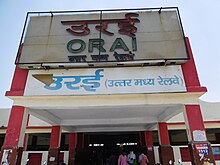
Aalah of the Banaphar Rajput clan was the famous general of the great Chandel king Parmal, who fought Prithviraj Chauhan in 1182 CE. Alha is one of the heroes of the Alha-Khand poem, popularly recited in the Bundelkhand region of India, a work that is also known as Parmal Raso.
The town of Kalpi on the Yamuna was conquered by the armies of Muhammad of Ghor in 1196. Early in the 14th century the Bundelas occupied the greater part of Jalaun, and even succeeded in holding the fortified post of Kalpi. During 1553-56, the Hindu Prime Minister and Chief of Army of Suri empire, who later became Emperor of north India at Delhi with coronation on 7th Oc.1556 won this area. He established Hindu Raj in north India and acquired title of Vikramaditya. After Hem Chandra Vikramaditya's death at 22nd battle of Panipat, this important possession was soon recovered by Akbar's army, and passed under the way of the Mughal Empire. Akbar's governors at Kalpi maintained a nominal authority over the surrounding district, and the Bundela chiefs were in a state of chronic revolt, which culminated in the war of independence under Maharaja Chhatrasal. On the outbreak of his rebellion in 1671 he occupied a large province to the south of the Yamuna. Setting out from this base, and assisted by the Marathas, he conquered the whole of Bundelkhand. On his death in 1732 he bequeathed one-third of his dominions to his Maratha allies, who before long succeeded in annexing the whole of Bundelkhand. Under Maratha rulethe country was a prey to constant anarchy and strife. In 1806 Kalpi was made over to the British, and in 1840, on the death of Nana Gobind Ras, his possessions lapsed to them also. Various interchanges of territory took place, and in 1856 the boundaries of the British district were substantially settled, with an area of 1477 square miles.
Orai, Jalaun was the scene of much violence during the Revolt of 1857. When the news of the rising at Kanpur reached Kalpi, the men of the 53rd Native Infantry deserted their officers, and in June the Jhansi rebels reached the district, and began their murder of Europeans. It was not until September 1858 that the rebels were finally defeated. In the later 19th century, the district suffered much from the invasive kans grass (Saccharumspontaneum), owing to the spread of which many villages were abandoned and their land thrown out of cultivation. The population of the district was 399,726 in 1901, and the two largest towns are Konch and Kalpi (pop. 10,139 in 1901). The district was traversed by the line of the Indian Midland railway from Jhansi to Kanpur. A small part of it is watered by the Bethwa Canal. Grain, oil-seeds, cotton and ghee were exported.


0 Comments